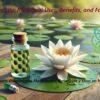Hello, dear readers. Today we will discuss folk remedies for treating a runny nose. When you have a runny nose, you can certainly rush to the pharmacy, but you can also try folk medicine recipes. In addition, folk remedies can be as effective as medications, provided you can tolerate them and have no allergies. A runny nose, also known as rhinitis, is an inflammation of the nasal mucosa caused by various viruses and microbes. A runny nose is often the first symptom of a cold. Initially, clear mucus is discharged from the nose, but as the condition progresses, the mucus can change color to yellow, and sometimes green. The nose gets congested, causing discomfort.
A runny nose can also arise from allergies, such as to pollen, food, or animal fur. Treating a runny nose should involve a comprehensive approach.
Folk Remedies for Treating a Runny Nose
I remember that when I had a runny nose as a child, my mother often dripped onion juice, beet juice, and aloe into my nose, and it really helped. My nose would breathe freely. In the past, my mother relied solely on folk remedies for colds, but nowadays, we tend to rush to the pharmacy. However, whether to go to the pharmacy or try folk remedies for a runny nose is each person’s choice. I’m not trying to persuade you; I’m just offering proven folk medicine recipes.
Beet Juice: Drip beet juice into your nose three or four times a day. You can dilute beet juice with honey, using 30% honey. Drip two drops into each nostril. Beet juice can treat not only a runny nose; you can read about it in my article “Treating with Beet Juice.”
Onion Juice: I remember this remedy from my childhood when my mother dripped onion juice into my nose, making me sneeze immediately, but it worked. This is an effective remedy. You need to squeeze the juice from an onion and drip it into your nose, but this is only for the strong-hearted. Generally, onion juice should be mixed with boiled water in a 1:1 ratio, and drip 2-3 drops into each nostril. My mother would usually grate the onion and squeeze the juice through a gauze. Alternatively, you can finely chop the onion and infuse it in vegetable oil, then use this oil to lubricate each nostril.
Sea Salt: I recently wrote an article about treating with sea salt, which you can read here. Take a teaspoon of sea salt and a liter of boiled water at room temperature. Dissolve the sea salt in the water. Use this solution to rinse your nose when it’s congested. You can do this with a teapot with a narrow spout, a syringe without a needle, or a pipette for small children. Sea water effectively reduces swelling and inflammation of the nasal mucosa. However, do not make the solution too salty, as it can burn the mucous membrane of the nose and throat, potentially causing a loss of voice. For instance, we once rinsed my son’s nose with natural sea water when he was 2 years old. He would swallow some of the sea water, which eventually led to a loss of voice. After rinsing with sea water or a sea salt solution, if water enters the throat, rinse the throat with clean water.
Aloe Juice: This was another remedy we tried during my childhood. Take an aloe leaf from a plant that is at least three years old. Cut the leaf, wash it, peel it, squeeze out the juice, and use a pipette to drip 2-3 drops into each nostril, 3-4 times a day. The effect is almost the same as with onion juice.
Carrot Juice: Carrot juice is also a good folk remedy for a runny nose. Peel the carrot, wash it well, grate it finely, and squeeze the juice through gauze. Mix carrot juice with refined vegetable oil in a 1:1 ratio. Drip 3-4 drops into each nostril, three times a day. You can even drip carrot juice into the noses of babies, but dilute the juice with boiled water in a 2:1 ratio (2 parts juice, 1 part water). This was how I relieved nasal congestion in infants.
Eucalyptus Oil: Eucalyptus oil has anti-inflammatory and disinfectant properties. Preparing eucalyptus oil is quite simple. Take 200 ml of vegetable oil and 2 tablespoons of eucalyptus leaves. Boil the oil with eucalyptus in a water bath for 15 minutes. Let it infuse for 4 hours, then strain it. Drip 3 drops into each nostril.
Inhalation: Inhalation is very helpful for a runny nose. Brew chamomile, eucalyptus, and mint. Use a tablespoon of the herb mixture per liter of water, boil for 5 minutes. Pour the decoction into a container and inhale the steam under a towel.
Folk remedies for treating a runny nose are effective and good, but you should consider individual intolerance to certain remedies and allergies to herbs. In such cases, it’s best not to use folk remedies.







